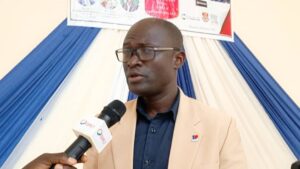Illegal mining threatens water security in Central Region – GWCL

The Ghana Water Company Limited has bemoaned the continuous destruction of water bodies through illegal mining activities, particularly in the Central Region.
Mr Nicholas Okyere, the Water Quality Assurance Manager in the region, said the situation had become a regional security threat considering the increasing cost of polymers used to treat water.
The pollution was essentially through the use of poisonous chemicals such as mercury and cyanide by illegal miners, putting the country at risk of water insecurity.
“Pollution of water bodies caused by illegal mining puts communities at health risk. When water is contaminated with toxic chemicals, people are driven to locate alternative water sources,” Mr Okyere told the Ghana News Agency (GNA), in an interview.
He said: “Many of these sources are often contaminated with pathogens.
“We need bold action now to halt the further pollution of our water bodies and destruction of the vegetation. The spectacle at mining communities is an eyesore and requires immediate action to reverse the situation.”
The situation, he said, had reached alarming levels and was increasing the company’s cost of production by the day as more had to be spent to improve the turbidity levels.
The rising costs come in the form of using more treatment chemicals, the frequent breakdown of equipment, especially pumps, and the rising levels of energy usage.
He said GWCL seeks to ensure safe drinking water for all, but “managing their machines has become a challenge. This compels us to regularly shut down to maintain machines.
The cost of treatment and the water treatment processes to ensure all-time quality have compounded the situation.
Anytime the machines are shut for maintenance, people would not have water to drink, causing the cost to multiply.”
The Region operates and maintains nine water supply production systems with an installed capacity of 136,830m³/d from seven water sources.
They are Brimsu Headworks – Kakum River; Kwanyaku Headworks – Ayensu River; Sekyere Hemang Headworks – Pra River; Baifikrom Headworks – Ochi Amisa River; Essakyir Headworks – Ochi Nakwa River; Breman Asikuma Headworks – Ochi River and Winneba Headworks – Ayensu River.
Going forward, he stated that Ghana requires a substantial amount of money to dredge and clean the rivers and water bodies heavily polluted by illegal small-scale miners.
The dire health consequences of drinking water polluted through galamsey are imminent, with researchers and health experts already establishing health complications linked to the menace.
He urged the citizenry to own the fight against illegal mining to safeguard quality and access to potable drinking water for all.
Source: GNA
